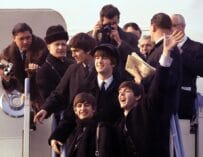
The Beatles having fun with Birmingham’s police officers in 1963. Pic: Wikimedia Commons/West Midlands Police
Author of ‘Help! 100 Songwriting, Recording And Career Tips Used By The Beatles’, David Rowley, highlights the Fab Four’s mischievousness
There is not much direction on the role of play or mischief in the songwriting books, which strikes me as an oversight as around one in every four Beatles songs can be traced, in inspiration, to the desire to amuse or a desire to break songwriting rules. The benefits of play on productivity and creativity are well recorded by numerous modern studies of the workforce, but back in the 1960s The Beatles just seemed to intrinsically understand this.
The ruse is true throughout their career. Look at any of their albums, say Sgt. Pepper’s Lonely Hearts Club Band. Of its 13 tracks, the title song and reprise are a pastiche of Jimi Hendrix, with heavy metal guitars and Paul mimicking the guitar hero’s raspy vocals; Fixing A Hole is an unlikely drugs and DIY double entendre; When I’m Sixty-Four is a light-hearted spoof on ageing written by Paul when he was 16; Being For The Benefit Of Mr Kite is John lifting his lyrics near wholesale from a Victorian publicity poster.
What’s more, where one’s initial assumption might be that their songs written out of a sense of fun are less special and less serious – the above Sgt. Pepper songs are not among my favourites – some are actually among their most admired works. Indeed, many Beatles innovations which are interpreted as profound or cool are actually, in my estimation, inspired by mischief.
There’s always one
Their best example arises from their attempts to write a song with one chord. At the peak of Beatlemania, when they were under the microscope of media and public attention, probably at the time they released the multi-chord Yesterday, the Beatles started joking to each other about this idea. In their imagination this would be a song so tuneless it would baffle the public’s and the critic’s expectations of what a Beatles’ song should sound like. The joke would have been a counter reaction to the pressure of trying to go one better than Yesterday.
Coincidentally, around this time, they sat down together to listen to a long piece of sitar music that only used a single chord. This precedent gave them the green light to move ahead with this idea. Only John Lennon fully took on the challenge by writing Tomorrow Never Knows, but there are long single chord stretches on Norwegian Wood, Eleanor Rigby and Paperback Writer. Paul, in his biography, recalled how he ‘vamped’ a melody around a single E minor chord to create Eleanor Rigby.

The Beatles in Hötorgscity, Stockholm 1963. Pic: Wikimedia Commons/Public Domain
What is notable about each of these songs is that lyrically they are among their boldest. Both Tomorrow Never Knows and Eleanor Rigby tackle the issue of death in their lyrics – it was as if monotone tunes needed a different, more dark set of emotions – while their arrangements on these songs are among their most innovative. With less harmonic interest, each is rooted in a complex time signature or rhythm. I think the Beatles felt that if a song was only going to have one or two chords in it, then they had better up their game elsewhere.
Sex, drugs and rock ‘n’ roll
Another key role of mischief in the Beatles’ songwriting was the way it allowed them to focus to work to a high standard. Part of the drive for all four of them in getting Please Please Me, Day Tripper, Yellow Submarine, Penny Lane and Get Back written and recorded to a high standard was the thrilling knowledge that each either contained hidden sexual innuendo or drug references that the censors might or might not spot. These were after all, songs largely written by young men for a young audience. I should add here that while the notion that Yellow Submarine is a double entendre about the barbiturate drug Nembutal, which came in a yellow capsule, is a matter of dispute, the simple use of mischief in so much of the Beatles songwriting leads me to believe it is true.
The imitation game
There are many other games the Beatles played with their songwriting, but the one that most needs mentioning is the role of parody. This was a favourite ruse of Paul McCartney – the act of imagining you are another singer and having fun with the way they sing and write. His best-known parody was an attempt to sound like a sophisticated singer of French songs to impress girls at the art school parties that John Lennon would invite him to pre-fame in Liverpool in the late 1950s. In its earliest guise Michelle was a bunch of mumbled words that sounded vaguely French, but it turned into something much more heartfelt when he re-wrote it in 1965. Helter Skelter was the Beatles having fun by creating the heaviest sound they could imagine for a rock band. Back In The USSR was a combined parody of the Beach Boys and Chuck Berry, Lady Madonna was a Fats Domino parody and as stated above the title track to Sgt. Pepper’s is Paul imagining himself as Hendrix.
Is there a song or a style of music that strikes you as over the top, amusing, a little ridiculous? Would it be fun to make a parody of it?
David Rowley is the author of Help! 100 Songwriting, Recording And Career Tips Used By The Beatles, which is available to buy from amazon.co.uk


































Related Articles